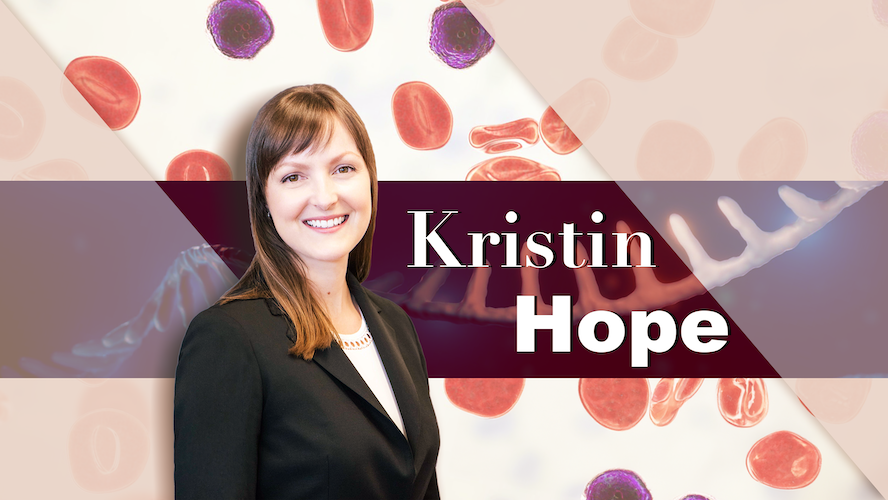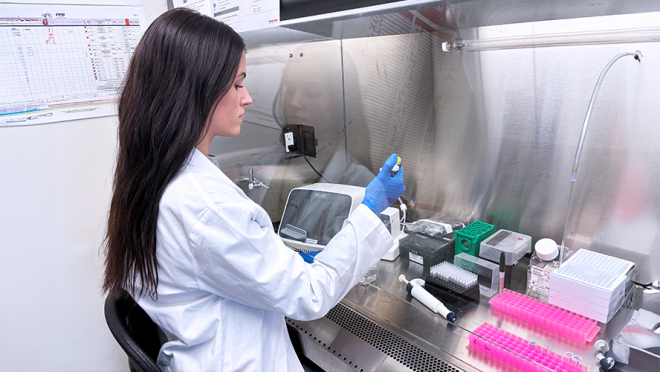
From cancer stem cells to normal stem cells
Dr. Kristin Hope is a pioneer in studying the role of RNA binding proteins in stem cell function and cancer initiation. She first became interested in stem cells while she was completing her PhD in the lab of Dr. John Dick, a world-renowned leukemia stem cell researcher and Senior Scientist at Princess Margaret Cancer Centre (PM).
At that time, Dr. Dick’s lab was the first to show that a rare population of leukemia stem cells is the root cause of blood cancer development.
“For me, it was the first introduction into the world of cancer stem cells, and I realized that studying them has incredible potential to bring transformative changes for human health,” says Kristin. During her PhD, Kristin focused on the behavior of leukemia stem cells to identify potential therapeutic insights.
Her postdoctoral work, supervised by Dr. Guy Sauvageau at the University of Montreal, delved into the inner workings of blood stem cell function.
“After studying leukemia stem cells and their behavior, I wanted to understand at a very granular level, how normal stem cells work, so that we can reverse engineer the disease process,” says Kristin. In Dr. Sauvageau's lab, Kristin designed high-throughput RNA interference screens to identify proteins of interest that govern stem cell fate and decision-making.
Kristin's passion for unraveling the biology of malignant and normal stem cells led her to establish her own lab, where she integrates the behavioral understanding of human cancer stem cells with the underlying cellular mechanisms.
A creative addition—RNA binding proteins
New focus on RNA binding proteins
A stem cell can asymmetrically divide into two functionally different cells—one stem cell and one non-stem cell—a process that can be determined by the differential separation of cellular components into two daughter cells.
Fascinated by this process, Kristin sought to determine whether certain proteins can decide the fate of daughter cells during cell division. In the screening experiment during her postdoctoral study (published in Cell Stem Cell), she found that one of the regulators of the asymmetric division process, Musashi2, is critical for maintaining blood stem cells. The daughter cell that does not receive Musashi2 loses its stemness and becomes differentiated.
Musashi2 also happens to be an RNA binding protein (RBP), which prompted Kristin to investigate this class of proteins more systematically when she started her own lab.
“It has been an interesting discovery that, quite a few of these RNA binding proteins, not just a couple, are overexpressed in leukemic stem cells,” says Kristin. “The focus on RNA regulation in the context of cancer stem cells has not been pronounced, but that is changing.”
The complexity of cancer-driving RBPs
To determine which RBPs might be therapeutic targets for anti-cancer treatment, Kristin’s team conducted a CRISPR screen (published in Blood Cancer Discovery) to identify RBPs that are vital for cancer cell survival but have a minimal impact on normal stem cells if inhibited.
“We have identified 32 RNA binding proteins that are really critical for in vivo leukemia growth,” says Kristin.
Among the 32 targets, one RNA binding protein, ELAVL1, was particularly noteworthy. ELAVL1 binds and stabilizes the RNA transcript that codes for a mitochondrial import protein. This particular protein plays a crucial role in supporting oxidative phosphorylation, a metabolic process that cancer cells depend heavily on for their function and survival.
When the team deleted ELAV1 in vivo, they detected a loss of the import protein and mitochondrial activity, which coincided with a reduction in leukemic stem cells. The study identified ELAV1 as a novel therapeutic target for leukemic stem cells in acute myeloid leukemia, through its regulation of mitochondrial metabolism.

Ana Vujovic, first author of the study and a PhD student at Hope Lab.
Apart from RNA stabilizers like ELAVL1, there is another subgroup of RBPs that can splice RNA, providing diverse instructions for protein production. Kristin’s team also discovered that certain RNA splicing proteins can be targeted to treat acute myeloid leukemia in a study published in Nature Communications.
According to Kristin, RBPs that are important in a full-blown leukemic stage are also found to be important in the early stages. A pre-leukemic condition called myeloid dysplastic syndrome, where 30% of cases progress to leukemia, is marked by disrupted RNA splicing.
“Advancing science is an incredibly creative process,” says Kristin. “Sometimes we need to approach the question from a few different angles.”
Creating a supportive working environment
Kristin advocates for a working environment that is supportive, collaborative, and inclusive.
Having had kids while running a lab herself, she recognizes that being a scientist has traditionally been a challenging career choice for women. On the International Day of Women and Girls in Science, Kristin speaks to the importance of supporting young parents while they are pursuing a career in science.
“I remember having conversations with young women over the years, who have sat across the desk and said, ‘I don’t know if I should try to be a principal investigator because then I won’t be able to have a family,’” Kristin recalls.
“We should be supporting young parents so that they can thrive in the lab and have a family at the same time. The unique challenge that a woman principal investigator can face is when she is on parental leave with a very young child and at the same time trying to manage a lab on top of everything else. Creative solutions to support them during their leave can be a huge game-changer. Likewise, we should also recognize and support men who take parental leave to care for their children.”
“Being cognizant of people's personal lives, whether they are men or women, a parent or not a parent is important. I think that we need to do more in terms of setting boundaries and allowing people to have and enjoy their personal time.”
“I hope as a research community we can foster an environment where people don’t have the ‘scientist or family’ conversations anymore. There shouldn't be a question about whether you can have a family while doing this job. You can.”
Meet PMResearch is a story series that features Princess Margaret researchers. It showcases the research of world-class scientists, as well as their passions and interests in career and life—from hobbies and avocations to career trajectories and life philosophies. The researchers that we select are relevant to advocacy/awareness initiatives or have recently received awards or published papers. We are also showcasing the diversity of our staff in keeping with UHN themes and priorities.




